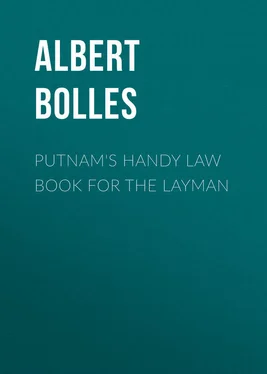Albert Bolles - Putnam's Handy Law Book for the Layman
Здесь есть возможность читать онлайн «Albert Bolles - Putnam's Handy Law Book for the Layman» — ознакомительный отрывок электронной книги совершенно бесплатно, а после прочтения отрывка купить полную версию. В некоторых случаях можно слушать аудио, скачать через торрент в формате fb2 и присутствует краткое содержание. Издательство: Иностранный паблик, Жанр: foreign_antique, foreign_prose, на английском языке. Описание произведения, (предисловие) а так же отзывы посетителей доступны на портале библиотеки ЛибКат.
- Название:Putnam's Handy Law Book for the Layman
- Автор:
- Издательство:Иностранный паблик
- Жанр:
- Год:неизвестен
- ISBN:нет данных
- Рейтинг книги:5 / 5. Голосов: 1
-
Избранное:Добавить в избранное
- Отзывы:
-
Ваша оценка:
- 100
- 1
- 2
- 3
- 4
- 5
Putnam's Handy Law Book for the Layman: краткое содержание, описание и аннотация
Предлагаем к чтению аннотацию, описание, краткое содержание или предисловие (зависит от того, что написал сам автор книги «Putnam's Handy Law Book for the Layman»). Если вы не нашли необходимую информацию о книге — напишите в комментариях, мы постараемся отыскать её.
Putnam's Handy Law Book for the Layman — читать онлайн ознакомительный отрывок
Ниже представлен текст книги, разбитый по страницам. Система сохранения места последней прочитанной страницы, позволяет с удобством читать онлайн бесплатно книгу «Putnam's Handy Law Book for the Layman», без необходимости каждый раз заново искать на чём Вы остановились. Поставьте закладку, и сможете в любой момент перейти на страницу, на которой закончили чтение.
Интервал:
Закладка:
A bailor need not always be the owner of the thing bailed. He may be a lessee, agent, or having such possession and control as would justify him in thus acting. He should give the bailee notice of all the faults in the thing bailed that would expose him to danger or loss in keeping it. For example, if it were a kicking horse, he should warn the bailee to keep away from his legs.
The courts have been often troubled about the degree of care required of bailees, as it differs under varying circumstances. A bank that permits a depositor to keep a box of jewelry or silver in its vault for his accommodation, while absent from home and without receiving any compensation therefor, is not required to exercise the same degree of care as a safe deposit company whose chief business is to do such things and is paid for its service. Nevertheless a bank must exercise reasonable care, such care as is used in keeping its own things.
Suppose your package is stolen by the cashier or paying teller, is the bank responsible? That depends. If the bank knows or suspected the official was living a gay life, it ought not to keep him, and most banks would not. It is the better legal opinion, that a bank ought not to keep a president, cashier or other active official who is speculating in stocks, for the temptation to take securities not belonging to them has been too great in many cases for them to withstand. On the other hand if a long-trusted official, against whom no cause for suspicion had arisen, should steal a package from the safe, the bank would not be responsible for the loss any more than if it had been stolen by an outsider. The bank did not employ him to steal, but to perform the ordinary banking duties.
A bailee is usually a keeper only. But the nature of the property may require something more to be done. If he is entrusted with a milch cow, he must have her milked, or with cattle in the winter time which require to be served with food, he must supply it, otherwise they would starve. If he is keeping a horse which is taken sick, proper treatment should be given.
When the period of bailment is ended, the thing bailed must be returned. If it consisted of a flock of sheep, cattle and the like, all accessions must also be delivered. In many cases the bailee is not required to return the specific property, but other property of the same kind and quality. Thus if one delivers wheat for safekeeping, which is put in an elevator, the contract is fulfilled by delivering other wheat of similar kind and quality; or, if the wheat is to be made into flour, by delivering the proper amount of the same quality as the specific wheat bailed. A bailee has a lien for his service and proper expenditures in caring for and preserving the thing bailed, but not for any other debt the bailor may owe him. And if the bailee is a finder who has bestowed labor on the article found in good faith, the same rule applies.
Agisters and livery-stable men have no lien at common law, like carriers for keeping the animals entrusted to them because they are under no obligation to take them into their keeping. In Pennsylvania a different rule was long ago declared, and has ever since been maintained. As he can agree on terms, he may make such as are agreeable to both parties. Elsewhere he can impose his own terms, and may demand his pay in advance, or create, by contract, a lien if he pleases. A person who is hired as a groom to a horse for a specified time and at a fixed price, has no lien on the horse for his service, but has a lien for feed, keeping and shoeing, which should have been furnished by the owner. A contract to do this is not necessary to create the lien, it arises as if the horse had been left for keep and care without saying more.
Bankruptcy.– Before the enactment of the federal Bankruptcy Act of 1898, every state had a bankruptcy act of its own, which was generally called an insolvency law. The federal act has superseded these by virtue of the power granted to congress in the federal constitution "to establish uniform laws on the subject of bankruptcies throughout the United States."
The United States district courts in the several states are made courts of bankruptcy and have power to adjudge all persons bankrupt who have their principal places of business, residence and domicile within their respective districts; and jurisdiction also over others who simply have property within their jurisdiction.
Any person who owes debts, or business corporation, may become a voluntary bankrupt. So may an alien. He may also become an involuntary bankrupt if he has had his principal place of business here, or has been domiciled within the jurisdiction of the court for the preceding six months, or has property within its jurisdiction. Some corporations are still denied voluntary action, as well as minors and insane persons.
Who may become an involuntary bankrupt? Any person, except a wage-earner, or farmer, any unincorporated company, and any corporation engaged principally in manufacturing, trading, printing, publishing, or mercantile pursuits, owing debts to the amount of one thousand dollars. What is a manufacturing corporation, within the meaning of the law, is not even yet fully known. A corporation engaged principally in smelting ores is one; and a mining corporation, whose principal business is to buy and sell ores, is deemed a trading corporation and may become an involuntary bankrupt.
Next we may inquire, what are acts of bankruptcy? One of them is an admission of a person's inability to pay his debts. And this may be done by a corporation through its properly organized officers. Another act of bankruptcy is to convey, transfer, conceal or remove property with the intention to defraud creditors. And by concealment is meant the separation of some tangible thing like money from the debtor's estate, and secrete it from those who have a right to seize it for payment of their debts. The transfers of property covered by the act are those which the common law regards as fraudulent. If, for example, at the time of the transfer of his property one is so much indebted that it will embarrass him in paying his debts, the transfer will be deemed fraudulent; but a voluntary transfer, made by one who is free from debt, cannot be impeached by subsequent creditors. The intention to hinder, delay or defraud creditors is a question of fact to be ascertained by proper judicial inquiry.
A general assignment for the benefit of creditors is an act of bankruptcy. Likewise a general assignment for the benefit of creditors made by the majority of the board of directors and of the stockholders is an act of bankruptcy. A petition for the appointment of a receiver of a corporation under a state statute is not an assignment for the benefit of creditors and therefore is not an act of bankruptcy.
Another act of bankruptcy is to suffer or permit, when one is insolvent, any creditor to acquire a preference through legal proceedings. The term preference includes not only a transfer of property, but also the payment of money within four months from the time of filing his petition in bankruptcy. It is immaterial to whom the transfer is made if the purpose be to prefer one creditor to another. Like a fraudulent transfer the intent to prefer must be proved, though this may sometimes be presumed, as when the necessary consequence of a transfer or payment made by an insolvent debtor is to liquidate the debt of one creditor to the entire or partial exclusion of others.
Passing to the filing of the petition a voluntary petitioner should file his petition in the court of bankruptcy in the judicial district where he has principally resided for the preceding six months. When there is no estate and no claim has been proved and no trustee has been appointed, a bankrupt may withdraw his petition on paying the costs and expenses. The petition must be accompanied by a schedule of the petitioner's property, showing its kind and amount, location, money value, and a list of his creditors and their residences when known, the amount due to them, the security they have, and a claim to legal exemptions, if having any. After filing a voluntary petition the judge makes an adjudication. He may do this ex parte, that is without notice to creditors.
Читать дальшеИнтервал:
Закладка:
Похожие книги на «Putnam's Handy Law Book for the Layman»
Представляем Вашему вниманию похожие книги на «Putnam's Handy Law Book for the Layman» списком для выбора. Мы отобрали схожую по названию и смыслу литературу в надежде предоставить читателям больше вариантов отыскать новые, интересные, ещё непрочитанные произведения.
Обсуждение, отзывы о книге «Putnam's Handy Law Book for the Layman» и просто собственные мнения читателей. Оставьте ваши комментарии, напишите, что Вы думаете о произведении, его смысле или главных героях. Укажите что конкретно понравилось, а что нет, и почему Вы так считаете.












